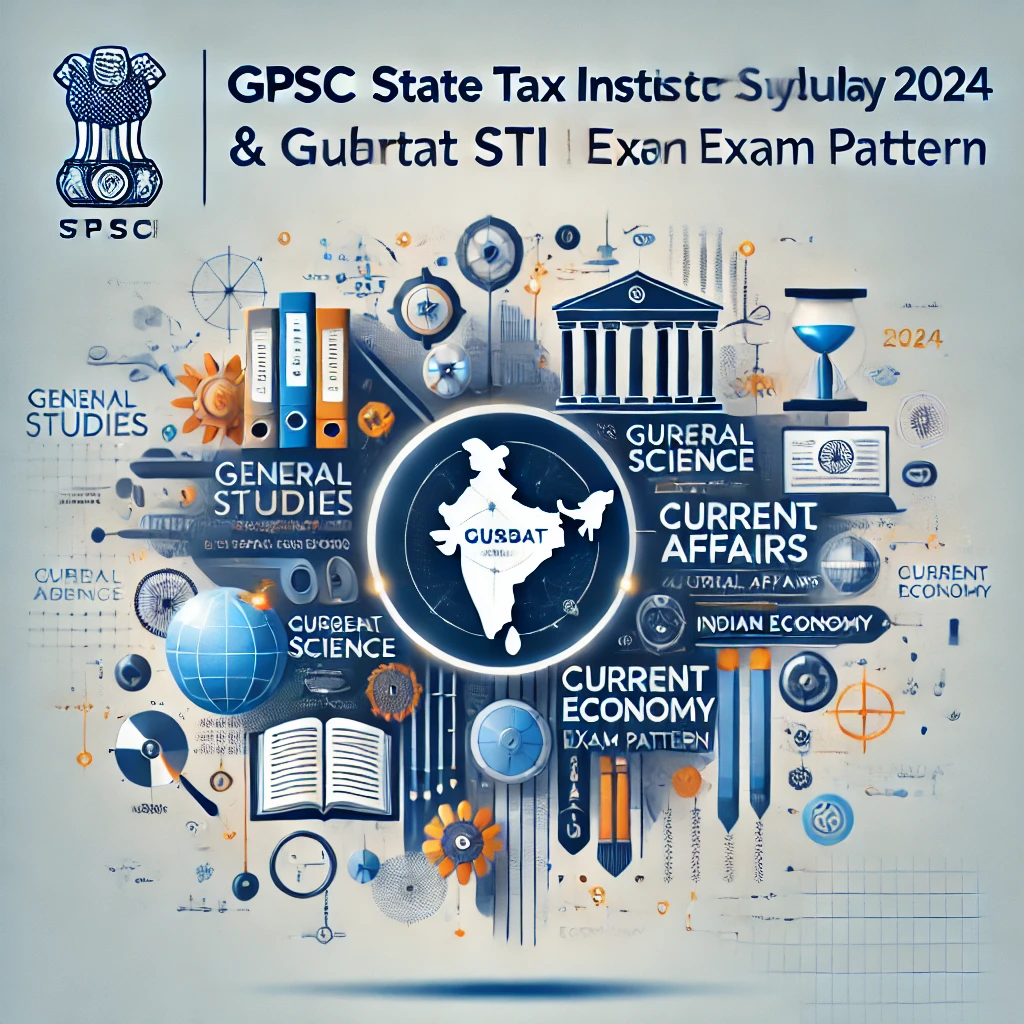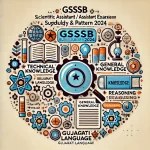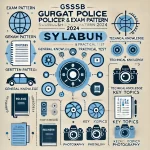Gujarat Public Service Commission (GPSC) will going to conducts State Tax Inspector (STI Class-3) Exam 2024-2025 to recruit candidates on 300 posts of Tax Inspector in the Gujarat State Finance Department.
STI post is a sought-after position, responsible for the administration and enforcement of tax laws. To succeed in this highly GPSC competitive exam, candidates must be well-prepared by understanding the GPSC tax inspector syllabus and STI exam pattern.
In this article, we will break down the GPSC State Tax Inspector (STI) Prelims and Mains Syllabus 2024 and provide details on the exam pattern, giving candidates a clear roadmap for their exam preparation.

GPSC Tax Inspector Exam Pattern 2024:- The selection process for the GPSC STI exam consists of two stages i.e, Preliminary Examination and Main Examination. We will explain both the exam pattern details below:-
Contents
- 1 GPSC Tax Inspector Preliminary Examination Pattern
- 2 Gujarat Tax Inspector Mains Examination Pattern
- 3 Important Links
- 4 GPSC State Tax Inspector Prelims Syllabus 2024
- 5 GPSC State Tax Inspector Mains Syllabus 2024
- 6 Paper 2: Mains English Language Syllabus
- 7 Paper 3: General Studies-1 Mains Syllabus
- 8 Paper 4: General Studies-2 Mains Syllabus
- 9 Final Words On Gujarat Tax Inspector Syllabus
- 10 Important FAQS
GPSC Tax Inspector Preliminary Examination Pattern
The Preliminary Exam is an objective-type screening test. It serves as the first step to shortlist candidates for the Main Exam.
- Total Marks: 200
- Duration: 2 hours
- Type of Questions: Objective (Multiple Choice Questions)
- Subjects Covered: General Studies (GS)
- Negative Marking: 0.3 marks for each wrong answer.
The Preliminary exam comprises 200 questions, each carrying 1 mark. The subjects included in the General Studies and this paper will cover a wide range of topics, making it overall comprehensive assessment of the candidate’s general knowledge and awareness.
| Paper | Subject | Question | Marks |
| Paper-I | General Studies | 200 | 200 |
| Time= 2 Hours |
Gujarat Tax Inspector Mains Examination Pattern
Candidates who clear the Prelims are eligible to appear for the Main Examination, which is descriptive in nature and more in-depth than the prelims. It tests the candidates on various subjects relevant to the duties of a State Tax Inspector. Candidates are assessed on their language skills as well as their knowledge of current affairs, history, polity, geography, and administrative system of Gujarat State.
- Type of Questions:- Descriptive
- Total Marks: 400
- Papers: 4
- Duration of Each Paper: 3 hours
- Paper 1: Gujarati Language (100 Marks)
- Paper 2: English Language (100 Marks)
- Paper 3: General Studies Paper-1 (100 Marks)
- Paper 4: General Studies Paper-2 (100 Marks)
| Paper | Subject | Max Marks |
| Paper 1 | Gujarati Language | 100 |
| Paper 2 | English Language | 100 |
| Paper 3 | General Studies-1 | 100 |
| Paper 4 | General Studies-2 | 100 |
| TOTAL | 400 |
Important Links
- For Latest GPSC Updates:- https://4syllabus.in/tag/gpsc
- Latest GSSSB Updates:- https://4syllabus.in/tag/gsssb
- For Latest Government Jobs in Gujarat:- https://4syllabus.in/tag/gujarat/
- Official GSSSB Website:- https://gpsc.gujarat.gov.in
- For Official GPSC Tax Inspector Syllabus & Pattern PDF:- CLICK HERE
GPSC State Tax Inspector Prelims Syllabus 2024
Paper-1 General Studies:- The General Studies syllabus for the Preliminary Exam covers a wide range of subjects, which include:
A: History
- Indus Valley Civilization: Characteristics, Places, Society, Cultural History, Art and Religion, Vedic Age- Jainism and Buddhism. Republics of Ancient India.
- Maurya and Gupta empires, Chola and Pallava dynasties. Vijayanagar Empire.
- Important dynasties of Gujarat-impacts and contributions, important policies, their administrative system, economy, society, religion, art, architecture and literature.
- Arrival of Europeans in India, establishment and expansion of British rule in India, India’s freedom struggle of 1857: with special reference to Gujarat, religious and social reform movements in India and Gujarat in the 19th century.
- Indian freedom movement, Indian revolutionaries in India and abroad, contribution and role of freedom fighters of Gujarat and India.
- Role and Contribution of Mahatma Gandhi and Sardar Patel in Pre-Independence and Post-Independence India.
- Post-Independence India: Reorganisation of States in the country, Mahagujarat Movement, Important events.
- Reformist measures and achievements of the rulers of the desi states of Saurashtra, Kutch and Gujarat.
B: Cultural Heritage:-
- Cultural Heritage of India and Gujarat: Art Forms, Literature, Sculpture and Architecture,
- Folk Culture and Oral Tradition of Gujarat: Its Important Characteristics and Implications.
- Arts and Crafts of Gujarat: Socio-Cultural Contribution.
- Tribal life.
- Pilgrims and Tourist Places of Gujarat.
C: Indian State System, Constitution, Social Justice and International Relations:-
- Indian Constitution-Emergence and Development, Characteristics, Preamble, Fundamental Rights and Duties, Guiding Principles, Important Constitutional Amendments, Important Provisions and Internal Structure.
- Union and State Functions and Responsibilities, Parliament and State Legislatures; Structure Functions Powers and Privileges, Role of President and Governor.
- Constitutional institutions, statutory, regulatory and quasi-judicial institutions. Panchayati Raj.
- Public Policy and Governance, Effects of Liberalization, Privatization and Globalization on Governance.
- Rights related issues (human rights, women’s rights, rights of Scheduled Castes and Scheduled Tribes, rights of children) etc.
- Foreign Policy of India- International Relations- Important institutions, agencies, various organizations, their structure and official mandate.
- Important policies and programs of Central and State Governments.
D: Indian Economy and Planning:-
- Indian Economy since Independence, Emergence and Development of Planning in India- Historical Discussions, Models of Planning and Changes Over Time,
- Indian Economy in Post-Reforms: New Economic Reforms, Niti Aayog: Objectives Constitution and Functions.
- Various economic policies and reforms in agriculture industry and service sector, infrastructure in Indian economy, banking and insurance: regulatory framework, impact of privatization on Indian economy, growth, challenges and opportunities.
- Indian Public Finance System: Indian Tax System, Public Expenditure, Public Debt, Food and Aid in the Indian Economy, Center and State Fiscal Relations, Goods and Services Tax (GST): Food and Implications. Important Institutions associated with Indian
- Public Finance Age. Role of Central Finance Commission and State Finance Commission.
- Trends, structure, structure and direction of India’s foreign trade.
E: Geography:-
- General Geography: Earth as a part of Solar System, Motion of Earth, Concept of time and seasons, Internal structure of Earth, Major landforms and their characteristics, Structure and organization of atmosphere, Elements and factors of climate, Air masses and atmosphere, Atmospheric disturbance, Climate change, Oceans: Physical , chemical, biological characteristics, aquatic disasters, marine and continental resources.
- Physical Geography: Major Natural Divisions, Earthquakes and Landslides, Natural Runoff, Seasonal Climate Regions, Atmospheric Disturbances, Cyclones, Natural Vegetation: National Parks and Sanctuaries, Major Land Types, Rocks and Minerals, with reference to India, Gujarat and World.
- Social Geography: India, Gujarat and World Context: Population Distribution, Population Density, Population Growth, Female Male Ratio, Literacy, Occupational Structure, Scheduled Caste and Scheduled Tribe Population, Ethnic Group, Linguistic Group, Rural-Urban Components, Urbanization and Migration, Metropolitan Regions.
- Economic Geography: Main divisions of the economy, agriculture, industry, services, their main characteristics, basic industries in agriculture, minerals, forestry, fuel and human labor dependent industries, transport and trade, methods and problems.
F: Science and Technology:-
- Science and Technology: Nature and Field of Science and Technology, Everyday use of science and technology in life, national policy on science, technology and innovation, various organisations involved in science technology and innovation in India, their activities and contributions, contribution of eminent Indian scientists.
- Information and Communication Technology (ICT): Form and Sector of ICT, Various Government Schemes promoting ICT, e-Governance Programs and Services, Cyber Security, National Cyber Crime Policy.
- Space/Technology in Space and Defense Services: Evolution/Development of Indian Space Programme, Various Institutions and Programmes.
- India’s Energy Policy and Nuclear Policy-Government Policies and Programmes.
- Environmental Science: Policies and treaties for environment conservation at national and international level, National Action Plan on forest and wildlife conservation, climate change and disaster management.
G: General Intellectual & Mental Ability:-
- Logical and analytical ability.
- Number Series
- Diagrams and their subdivisions, Venn Diagrams.
- Questions related to clock, calendar and age.
- Mean, median and polynomial, weightage and average.
- Exponents, Square Roots, Cube Roots, G.S.A. and L.S.A.
- Percent, simple and compound interest, profit and loss.
- Time and Work, Time and Distance, Speed and Distance.
- Area and perimeter, volume and surface area of simple geometric figures (cube with six parallel sides, cylinder, cone, sphere).
- Interpretation of data, analysis of data, sufficiency of data, probability.
H: Events of Regional, National and International Importance:-
GPSC State Tax Inspector Mains Syllabus 2024
The syllabus for the Main Examination is broader and more detailed compared to the Preliminary Exam, focusing on the candidate’s understanding of various subjects.
Paper 1: Gujarati Language Mains Syllabus:-
This paper tests the candidate’s command of the Gujarati language, topics include:
- નિબંધ: ત્રણ પૈકી કોઇ પણ એક (ઓશરે ૨૫૦ થી ૩૦૦ શબ્દોમાં) (વર્ણનાત્મક/ વિશ્લેષણાત્મ્ય/ ચિંતનાત્મક/ સાંપ્રત સમસ્યા પર આધારીત)
- વિચાર વિસ્તાર ( બે પૈકી કોઇ પણ એક) કાવ્ય પંક્તિઓ કે ગદ્યસૂક્તિનો વિચારવિસ્તાર (આશરે ૧૦૦ શબ્દોમાં)
- સંક્ષેપીકરણ: આપેલ ગદ્યખંડમાંથી આશરે ૧/૩ ભાગમાં તમારા શબ્દોમાં સંક્ષેપ
- ગદ્ય સમીક્ષા : આપેલા ગદ્યખંડના આધારે પુછેલા પ્રશ્નોના જવાબ લખો
- પ્રચાર માધ્યમો માટે નિવેદનો તૈયાર કરવા (આશરે ૧૫૦ શબ્દોમાં)
- પત્ર લેખન (અભિનંદન/ શુભેચ્છા/ વિનંતી ફરીયાદ વગેરે) (આશરે ૧૦૦ શબ્દોમાં)
- ચર્ચાપત્ર (આશરે ૨૦૦ શબ્દોમાં) (વર્તમાન પત્રમાં પ્રજાના પ્રશ્નો/ સાંપ્રત
- સમસ્યાઓ/ વ્યક્તિગત અભિપ્રાય રજુ કરતું ચર્ચાપત્ર)
- અહેવાલ લેખન (આશરે ૨૦૦ શબ્દોમાં)
- ભાષાંતર: અંગ્રેજીમાંથી ગુજરાતીમાં અનુવાદ
- ગુજરાતી વ્યાકરણ
- સુચવ્યા મુજબ જવાબ લખો. (આ પ્રશ્નોમાં આંતરિક વિકલ્પો રહેશે નહીં)
Paper 2: Mains English Language Syllabus
This paper evaluates the candidate’s proficiency in English, topics including:
- ESSAY (A minimum of 250 words and a maximum of 300 words): Choose any one topic from a list of five. (Descriptive/ analytical/ philosophical/ based on Current Affairs)
- LETTER WRITING (in about 150 words): A formal letter expressing one’s opinion about an issue. The issues can deal with daily office matters/ a problem that has occurred in the office/ an opinion in response to one sought by a ranked officer/issues pertaining to recent concern etc.
- REPORT WRITING (in about 200 words): A report on an official function/ event/ field trip/ survey etc.
- WRITING ON VISUAL INFORMATION (in about 150 words): A report on a graph/image/ flow chart/table of comparison/ simple statistical data etc.
- FORMAL SPEECH (in about 150 words): A speech (in a formal style) that is to be read out in a formal function. This could be an inauguration speech, an educational seminar/conference, a formal ceremony of importance etc.
- PRECIS WRITING: A précis in about 100 words for a 300-word passage.
- READING COMPREHENSION: A reading passage of about 250 words to be given followed by short answer type questions.
- ENGLISH GRAMMAR: Tenses, Voice, Narration(Direct-Indirect), Transformation of sentences
- Use of Articles and Determiners
- Use of Prepositions, Use of Phrasal, verbs h. Use of idiomatic expressions, Administrative Glossary, Synonyms/Antonyms, One-word substitution, Cohesive devices/ Connectives/ Linkers, Affixes, Words that cause confusion like, homonyms/ homophones.
- TRANSLATION: Translation of a short passage (of about 150 10 words) from Gujarati to English.
Paper 3: General Studies-1 Mains Syllabus
(a) History:-
- Indus Valley Civilization: Characteristics, Places, Society, Cultural History, Art and Religion, Indus Valley Civilization and Gujarat, Vedic Age- Jainism and Buddhism, Nanda Dynasty. Maurya and the Gupta Empire.
- Vijayanagar Empire and important dynasties of South India.
- Important dynasties of Gujarat- their administration, art, architecture, literature and science and technology.
- Educational Institutions: Taxila, Nalanda and Valabhi.
- Arrival of Europeans in India, establishment and expansion of British rule in India 1757 to 1856, land revenue system-permanent settlement, raiyatwari and mahalwari, education system.
- India’s freedom struggle of 1857, religious and social reform movements in India and Gujarat in the 19th century, factors responsible for the rise of nationalism in India, Indian National Congress.
- The rise of Mahatma Gandhi on the national scene and the role of his thought, principles and philosophy on the political, social, economic, religious and cultural life of India. Role of Sardar Patel in Independence Movement and Post-Independence Integration.
- Indian revolutionaries in India and abroad, Azad Hind Fauj and Subhash Chandra Bose. Post-Independence India: Reorganisation of States in the country, Maha-Gujarat Movement, Important Events.
(b) Cultural Heritage
- Salient features of Indian culture and its art forms, literature, sculpture and architecture from ancient to archaic times; Salient features of Indian society.
- Indian cinema and theater and its impact on society.
- Arts and Crafts of Gujarat
- Gujarati Theatre
- Folk Culture and Oral Tradition of Gujarat: Its Significance, Characteristics and Implications.
- Coastal culture and tribal culture of Gujarat.
(c) Geography
- Study of physical features and resources of Gujarat and India: major landforms, climate, soil, rocks, rivers, reservoirs, vegetation, mineral and water resources.
- Economic Activities: Primary, Secondary, Tertiary and Quaternary
Social and Demographic Geography. - Developmental and environmental issues, sustainable development, globalization; Its Social and Economic Impacts, Smart Cities and Solutions. Natural hazards, carbon emissions, pollution hazard management. Global response to climate change and environmental degradation problems: important treaties and conventions.
(d) Science and Technology
- Integrating Science Technology and Innovation for a Better Human Life Science and Technology in Everyday Life; India’s contribution in the field of science and technology, challenges and constraints in application and diffusion of science and technology, role and scope of science and technology in nation building.
- Information and Communication Technology: (ICT) – Its Importance, Benefits and Challenges, E-Governance and Policies in India, Cyber Crime and Cyber Security.
- India’s Space Programme: Past, Present and Future. Energy Policy and Nuclear Policy of India.
- Importance, benefits and challenges of technology in defence services.
- Matters related to intellectual property rights in the field of science and technology.
Paper 4: General Studies-2 Mains Syllabus
(a) Indian Administration System and Constitution
- Constitution of India and its salient features.
- Functions and Duties of Indian Union and State Governments.
- Issues and Challenges Related to Treaty Structure – Role of Governor in States.
- Division of Powers between Central and State Governments (Central List, State List, Concurrent List), Issues and Challenges.
- Important constitutional amendments.
- Constitutional institutions and their role.
- Parliament and State Legislatures – Structure, Functioning, Executive Powers and Privileges and Allied Matters.
- Judiciary in India – structure and functions, important emergency provisions and constitutional amendments, judicial review, public interest litigation.
- Ethics in public administration, governance and public service
- Role of Civil Service in Democracy. Government policies regarding the development of various sectors and interventions, implementation issues and problems.
- Statutory, regulatory and various quasi-judicial bodies.
- Good governance and e-governance- transparency, accountability and sensitivity in governance-
- Bill of Rights, Right to Information, Public Service Act and implications of this survey, social exploration and its importance.
- Ethics, Integrity and Accountability in Public Service- Right to Information Act, Public Service Act and its implications.
- Ethical Issues and Challenges-Anti-corruption Mechanism, Lokpal, Lokayukta.
(c) Commerce and Management
- Business and Commerce:- Types of business including international business, stock exchange in India, e-commerce, role and intervention of government in business and commerce, mechanisms for regulating trade, World Trade Organization (WTO). SAARC, ASEAN and BRICS.
- Fiscal and Fiscal Policy of India:- Basic Concept of Principles, Characteristics of Taxation and Implications Indian Public Finance; Indian Taxation System, Public Expenditure, Public Debt and its Management, Food and Aid in Indian Economy. Center and State Fiscal Relations. Role of Central Finance Commission and State Finance Commission. Various indicators of economy, important institutions associated with Indian Public Finance. Inflation and its effects on the economy, different concepts on inflation.
- Types of budgets and public debt, The Fiscal Responsibility and Budgetary Management Act. Consolidated Fund and Public Accounts of India and States under Article 266 of the Constitution.
- Income tax including corporate tax: salary, property, business, calculation of income from business, capital gain and other sources; Methods of valuation, assessment of individual, partnership firm and joint stock company. Goods and Service Tax (GST).
(d) Indian Economy and Planning
- Indian Economy:- Emergence and Development of Planning Practice in India. Central and State Government economic performance, dynamics, challenges, new initiatives, reforms etc. Important events, developments and social sector initiatives. Niti Aayog: Objectives,
- Constitution and roles. Social Audit. Agriculture, Industries, Infrastructure Sector and Service Sector.
- Regulatory Framework for Finance and Banking:- Concepts, Structure and Role. Rural Development and Rural Economy-Challenges and Policies; Employment Policies/Schemes in India.
- External Sector:- Trends, Structure and Direction of Foreign Trade. External field improvements. Foreign Institutional Investment (FII) and Foreign Direct Investment (FDI).
- Economy of Gujarat:- An Overview; Gujarat’s economy, economic and social infrastructure development policies compared to India and other states. Co-operative movement in Gujarat and its impact on socio-economic aspects of life.
- Infrastructure:- Power, Ports, Roads, Airports, Railways, Telecommunications. Social Impact and Assessment.
Final Words On Gujarat Tax Inspector Syllabus
The GPSC State Tax Inspector Exam 2024 offers a significant opportunity for aspirants aiming for a prestigious career in Gujarat’s tax administration. With a comprehensive syllabus and structured exam pattern, proper preparation is key.
Understanding the syllabus, practicing past papers, and keeping updated on current affairs will help candidates succeed in the examination and secure a role as a State Tax Inspector.
Important FAQS
What is the syllabus for the GPSC STI Mains Examination 2024?
- Gujarati Language: Essay writing, comprehension, grammar.
- English Language: Essay writing, comprehension, grammar.
- General Studies (Paper 1): History, Cultural Heritage, Indian Economy, Environment, etc.
- General Studies (Paper 2): Indian Constitution, Governance, Technology, Current Affairs, etc.
What is the exam pattern for the GPSC State Tax Inspector Preliminary Exam?
- Total Marks: 200 marks.
- Duration: 2 hours.
- Type: Objective-type questions (MCQs).
- Subjects: General Studies.
Is there negative marking in the GPSC STI exam?
Yes, there is negative marking in the Preliminary Exam. For each wrong answer, 0.3 marks are deducted.
How should I prepare for the Gujarat-specific subjects?
Focus on Gujarat’s geography, cultural heritage, economy, and governance structure. Refer to Gujarat State Board books and recent developments related to Gujarat for a thorough understanding.
What is the language of exam paper?
The exam paper will be provided in Gujarati language except English Language paper.







